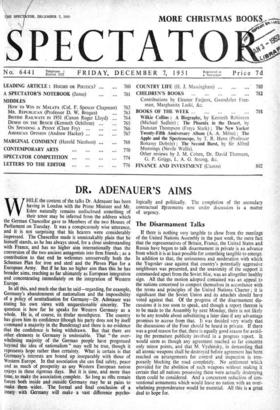The Disarmament Talks
If there is nothing very tangible to show from the meetings of the United Nations Assembly in the past week, the mere fact that the representatives of Britain, France, the United States and Russia have begun to talk disarmament in private is an advance from whicliit is at least possible for something tangible to emerge. In addition to that, the seriousness and moderation with which the Yugoslav case against that country's potentially aggressive neighbours was presented, and the unanimity of the support it commanded apart from the Soviet bloc, was an altogether healthy sign. All that the motion adopted contained was an appeal to the nations concerned to comport themselves in accordance with the terms and principles of the United Nations Charter ; it is significant that the Soviet Union and its attaches should have voted against that. Of the progress of the disarmament dis- cussions it is .too soon to speak, and though a report thereon is to be made to the Assembly by next Monday, there is not likely to be any trouble about substituting a later date if any advantage promises to accrue from that. It was decided very wisely that the discussions of the Four should be heard in private. If there was a good reason for that, there is equally good reason for avoid- ing the premature publicity involved in a progress report. It would seem as though any agreement reached so far concerns only minor points, and that M. Vyshinsky, in demanding that all atomic weapons shall be destroyed before agreement has been reached on arrangements for control and inspection is tem- porarily blocking the road completely. No settlement which provided for the abolition of such weapons without making it certain that all nations possessing them were actually destroying , them could be considered. And a concurrent reduction of con- ventional armaments which would leave no nation with an over- whelming preponderance would be essential. All this is a great deal to hope for.


















































